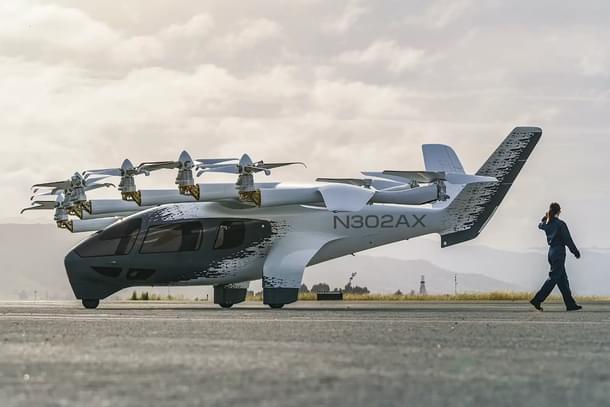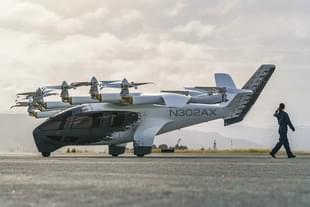Business
Flying Over Traffic: The Race For Air Taxi Supremacy Intensifies Globally
Swarajya Staff
Oct 05, 2024, 01:27 PM | Updated 01:27 PM IST
Save & read from anywhere!
Bookmark stories for easy access on any device or the Swarajya app.


Japan's Toyota Motor Corporation, the world's largest automaker by sales, announced on 2 October that it will invest an additional $500 million in Joby Aviation to accelerate the certification and commercial production of Joby’s electric air taxi.
Founded in 2009, the California-based company is among several startups hoping to make the vision of emission-free “urban air mobility” a reality through the launch of “electric vertical takeoff and landing” (eVTOL) aircraft.
Moving closer to commercialisation, the company recently rolled out its third aircraft from its pilot production line in Marina, California, and broke ground on a new facility that will more than double its manufacturing capacity.
Why It Matters
Around the globe, companies are racing towards what was once the realm of science fiction: battery-powered aircraft that take off like helicopters, cruise like aeroplanes, and meet regulatory standards for commercial use.
Referred to as air taxis, these eVTOLs promise to bypass congested city streets, offering an elegant solution to urban traffic. Their vertical take-off capabilities mean they don't need traditional runways, and their quiet operation makes them more suited for city landscapes than conventional helicopters.
The allure of reducing 60-90-minute car commutes to swift 10-20-minute air taxi flights is undeniable. Not only do these flights offer the potential for low-noise, eco-friendly travel, but they also promise to be cost-competitive with ground transportation.
Cities like Sao Paulo in Brazil already use helicopters to navigate heavy traffic, and in the United States (US), companies like Blade offer quick helicopter shuttles between Manhattan and the John F Kennedy airport for $195 a seat. But with quieter, battery-powered eVTOLs, the future of air mobility in urban areas seems even brighter.
Some Contenders
The global race for urban air mobility is rapidly gaining momentum. While the main players are spread across the US and Europe, emerging players from China and Brazil are also making their mark.
Though most of these companies are startups, many have attracted backing from industry giants like Airbus, Boeing, and Embraer. Not to be outdone, major automakers are also stepping into the competition, further intensifying the drive to bring electric air taxis to the skies.
Stellantis, Chrysler's parent company, is the largest shareholder in Archer Aviation, which is nearing the launch of its factory in Covington, Georgia, as well as certification for its "Midnight" eVTOL.
Europe’s Airbus, which has much deeper pockets than the startups, unveiled its fully electric "CityAirbus NextGen" prototype in March this year, ahead of its maiden flight later this year.
In China, EHang Holdings Limited is also pushing forward, determined to lead the commercial electric taxi market. Its pilotless eVTOL, the EH216-S, recently made history by completing the first passenger-carrying demo flight in Abu Dhabi, marking the first of its kind in the United Arab Emirates and Middle East.
In the United Kingdom (UK), Vertical Aerospace, founded by British entrepreneur Stephen Fitzpatrick, has partnered with Rolls-Royce and Honeywell to leverage their expertise. Vertical's VX4 eVTOL recently completed the first phase of its piloted flight test program, positioning itself as another serious contender in the global race.
Who Will Fly First?
None of these eVTOL aircraft has yet received certification from aviation regulators. In both the US and Europe, each company must obtain a "type certificate" approving the design of the aircraft and its components.
Beyond that, they will also need certification to demonstrate the aircraft's suitability for mass production, as well as approval to operate as an air carrier for those planning commercial flights.
However, Joby Aviation has taken the lead, becoming the first eVTOL company to have its certification plans accepted by the US Federal Aviation Administration (FAA). The company is now working towards full approval, with ambitions to launch its first commercial service in Dubai by next year.
Closer home, IndiGo, which has partnered with Archer to introduce electric air taxis in India, is awaiting FAA certification for Archer’s four-passenger aircraft, Midnight. Archer has already secured a US Part 135 Air Carrier Certificate from the FAA, enabling it to operate passenger flights similar to airlines.
The next 18 months will be critical for this emerging industry. Companies will need to push through rigorous flight test programs to achieve regulatory approval, placing a strain on resources.
Some may falter, unable to clear regulatory hurdles or meet the financial demands of commercialisation. In this crowded field, only a few will survive to redefine the future of urban air travel.





